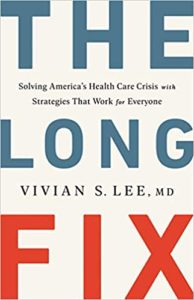You’ve heard EconTalk host Russ Roberts argue that the central problem in American health care is that doctors get paid to do stuff to us, rather than take care of us. In this episode, Roberts welcomes physician and author Vivian Lee to talk about her new book, The Long Fix, to continue this conversation.

Roberts and Lee discuss the rising cost of health care, the trend of over-treatment and diagnosis at the expense of better health, and sources of optimism for the future of health care, including possible “silver linings” to the COVID-19 pandemic. Health care, asserts Lee, is “flying into the headwinds of capitalism,” and unless the incentives inherent in the system can be changed, there is little chance for relief.
After listening to this episode, we hope you’ll use the questions below to start your own conversation, either on- or offline. You might be interested in looking back at the many previous EconTalk episodes on health care for even more conversational inspiration.
1- We’re used to Roberts saying that “we” don’t pay for our health care. Lee disagrees. How does Lee explain her position? How does her catering analogy contribute to her explanation?
2- What is the “Chargemaster,” and how does this often result in differential prices for different kinds of patients? In what ways does Lee believe that standardizing the Chargemaster could have a big effect on the price we pay for health care? How should this standardization be accomplished?
3- Roberts asks Lee for her sources of optimism, and she enthusiastically describes the Medicare Advantage programs. What is it she likes about them? How do they change doctors’s incentives positively?
4- What are some of the disruptive forces in primary care discussed in this episode that strike you as promising? Lee says,”What’s going to be really interesting in the next few years is the degree to which this kind of mindset can extend to secondary, tertiary care, to hospitalizations, and to rehabilitation. That’s really where more of the dollars are spent right now.” What are some of the challenges in these areas? To what extent do you think COVID-19 will inspire innovation in health care?
5- Lee’s professional focus now is on creating a “learning health system?” What does she mean when she says of the future, “We are going to pay for better health. We’re not going to be fee-for-service anymore. The days of fee-for-service are numbered. Let the tailwinds of capitalism push this forward.” To what extent do you share Lee’s optimism?


READER COMMENTS
mike newman
Jul 11 2020 at 12:15am
Prof. Roberts, why do you make it so hard to download the podcast? You should have a download option on this site. Don’t make us go through Itunes or whatever.
Other podcasts can do this why not you?
[Hi, Mike. It is very easy to download the podcast episodes. Right below each horizontal play bar, there is a big green button that says “Downoad.” Depending on your hardware (PC, Mac, tablet, laptop) and browser, you should be able to either click it, right-click it, or option-click it. If you right-click or option-click it, a drop-down list will appear. Select the appropriate option such as “Save,” “Save As,” “Download,” etc.–Econlib Ed.]
Frank
Jul 23 2020 at 1:20am
Long time listener and fan. First time commentor.
Just wanted to comment that I feel that the episodes with physicians are some of the least interesting episodes. The evidence based medicine episodes are great. The surgery center one was interesting. But traditional academic physicians pontificating economically/spiritually/etc just feel so shallow as compared to the usual fare. Maybe it’s because docs come in expecting Russ to be utterly hapless and dont go beyond the basics. But either way, they’re always dry to the point of being a chore. And I say that as a final year medical student with an interest in health economics.
I do not doubt that both russ and these interviewees could run circles around me. That’s why it’s so puzzling that these conversations are so trite and boring.
For instance yes, obviously doctors arent looking at icu patients like dollar signs for their hospital. That multiple-minute diatribe could have been boiled down to simply noting that physicians are salaried and that income is typically scaled to things that aren’t related to the price of the services ordered. I say that glibly, but there’s a lot to unpack there, and dr lee definitely would have known about it. For instance, dr lee definitely knows about doc pay being tied to revenue producing units. Or defensive medicine. These are really interesting topics and it would be so cool to unpack how docs *are* in some ways definitely incentivized indirectly to spend more. But instead we got very cliche’d statements about medical student idealism. Very disappointing.
To me, this whole interview felt appropriate for the lay public. But Russ is not the lay public and my understanding is that he doesnt prefer to discuss these topics at that level.
I am a devoted fan and will definitely continue to listen to these physician interviews on the off chance of gold (eg adam cifu), but I’d be remiss to point out what is now an obvious trend.
Comments are closed.